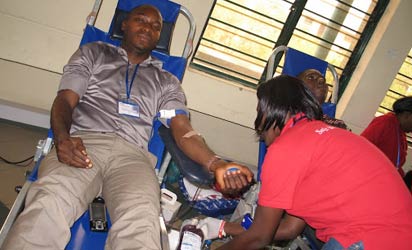15Sep2017
Seroprevalence of transfusion transmissible infections (TTI), in frst time blood donors in Abeokuta, Nigeria.
by admin, 0 Comments

Babatunde Olanrewaju Motayo1, 3 , Adedayo Omotayo Faneye3 , Usen Asuquo Udo2,
Babatunde Adebiyi Olusola3, Isreal EzeaniI.,2 , Joseph Iruobe Ogiogwa 1
1. Microbiology Unit, Pathology department, Federal Medical Centre, Abeokuta.
2. Hematology and Blood Transfusion Unit, Pathology department, Federal Medical
Centre, Abeokuta.
3. Department of Virology, College of Medicine, University of Ibadan.
Abstract
Background: Transfusion transmissible infections, such as HIV, HBV, HCV and syphilis are on the rise and pose a threat to blood safety.
Objective: To determine prevalence and demographic profles of TTI’s among frst time blood donors in Abeokuta, Nigeria.
Methods: The study was conducted between February to November 2013; 130 frst time blood donors were tested for the presence of HIV, HBsAg, HCV antibodies and Treponema palidium antibodies using EIA based rapid immunochromatographic kits. Data analysis was done using SPSS with a level of signifcance of p<0.05.
Results: Prevalence rates to HIV, HBsAg, HCV antibody, were 6.2% (n=8), 10% (n=13) and 1.5% (n=2), there was 0%
prevalence to Treponema palidium antibodies. Group specifc prevalence rates revealed that educational status was associated with HBsAg positivity (p = 0.028), donors with a history of previous blood transfusion was also statistically associated with HIV sero-reactivity (p = 0.013).
Conclusions: High levels of HBsAg and HIV were observed, there is need to revise the donor testing algorithm in Nigeria in line with the prevalence of TTI’s. We also advocate that a National surveillance system for TTI’s be established through our National blood transfusion service (NBTS) program, a second serological test is also suggested to reduce the risk of occult HBV infection in Nigeria.
Key words: Prevalence rate, TTI’s, Blood donors, Nigeria
DOI: http://dx.doi.org/10.4314/ahs.v15i1.3
Recent Posts
- Editor’s choice: Tackling infectious diseases, NCDs and sexual reproductivehealth issues as we enter our 24th year of remarkable growth
- Preconception and contraceptive care for women living with HIV/AIDSattending antiretroviral treatment clinics in Lagos State, Nigeria
- Effects of SNPs on TNF-α and IL-10 cytokine expression in TB and HIVpatients in the Capricorn district, Limpopo Province, South Africa
- Prevalence of Schistosomiasis in a neglected community, South western Nigeria at two points in time, spaced three years apart
- Review of Leishmaniasis in the Middle East and North Africa
Recent Comments
Categories
- 2001 Issues
- 2002 Issues
- 2003 Issues
- 2004 Issues
- 2005 Issues
- 2006 Issues
- 2007 Issues
- 2008 Issues
- 2009 Issues
- 2010 Issues
- 2011 Issues
- 2012 Issues
- 2013 Issues
- 2014 Issues
- 2015 Issues
- 2016 Issues
- 2017 Issues
- 2018 Issues
- 2019 Issues
- 2024 Issues
- Articles
- December issue
- December Release
- June Issue
- June Release
- March Issue
- March Issue
- March Release
- News
- number / volume 2
- number /volume 1
- number /volume 1
- number /volume 1 2008
- number 1
- number 1
- number 1
- number 1
- number 1
- number 1
- number 1
- number 2
- number 2
- number 2
- number 2
- number 2
- number 2
- number 2
- number 2 special Issue
- number 2 special Issue 2
- number 3
- number 3
- number 3
- number 3
- number 3
- number 3
- number 3
- number 4
- number 4
- number 4
- number 4
- number 4
- number 4
- number/ volume 3 2008
- number/ volume 4 2008
- number/volume 1
- number/volume 1
- number/volume 2
- number/volume 2
- number/volume 2 2008
- number/volume 3
- number/volume 3
- number/volume 3
- number/volume 4
- number/volume1
- September Issue
- September Release
- Special Edition
- special Issue
- Uncategorized
- Vol. 24 No. 1 (2024)
- volume 1
- volume 1
- volume 1
- volume 2
- volume 2
- volume 2
- volume 2
- volume 2
- volume 3
- volume 3
- volume 3
- volume 3
- volume 4
- volume 4
- volume 4
- volume 4
- volume1
Categories
- 2001 Issues
- 2002 Issues
- 2003 Issues
- 2004 Issues
- 2005 Issues
- 2006 Issues
- 2007 Issues
- 2008 Issues
- 2009 Issues
- 2010 Issues
- 2011 Issues
- 2012 Issues
- 2013 Issues
- 2014 Issues
- 2015 Issues
- 2016 Issues
- 2017 Issues
- 2018 Issues
- 2019 Issues
- 2024 Issues
- Articles
- December issue
- December Release
- June Issue
- June Release
- March Issue
- March Issue
- March Release
- News
- number / volume 2
- number /volume 1
- number /volume 1
- number /volume 1 2008
- number 1
- number 1
- number 1
- number 1
- number 1
- number 1
- number 1
- number 2
- number 2
- number 2
- number 2
- number 2
- number 2
- number 2
- number 2 special Issue
- number 2 special Issue 2
- number 3
- number 3
- number 3
- number 3
- number 3
- number 3
- number 3
- number 4
- number 4
- number 4
- number 4
- number 4
- number 4
- number/ volume 3 2008
- number/ volume 4 2008
- number/volume 1
- number/volume 1
- number/volume 2
- number/volume 2
- number/volume 2 2008
- number/volume 3
- number/volume 3
- number/volume 3
- number/volume 4
- number/volume1
- September Issue
- September Release
- Special Edition
- special Issue
- Uncategorized
- Vol. 24 No. 1 (2024)
- volume 1
- volume 1
- volume 1
- volume 2
- volume 2
- volume 2
- volume 2
- volume 2
- volume 3
- volume 3
- volume 3
- volume 3
- volume 4
- volume 4
- volume 4
- volume 4
- volume1
